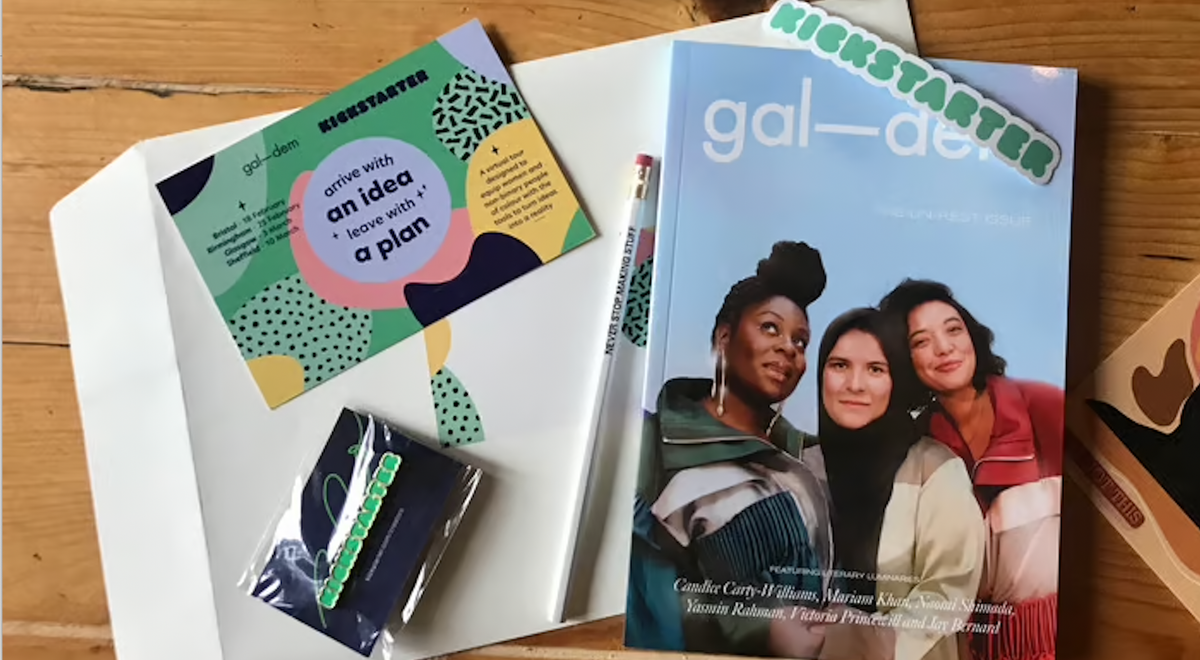9 Creators Share Advice From Their Journeys To Help Guide Yours
Over the last several weeks, we hosted a series of small workshops for creators of color and marginalized genders in the UK, in collaboration with gal-dem magazine. Here, we open up some of the insights and advice from those sessions to all.

Over the past several weeks, we’ve been virtually hosting small workshops for creators across Sheffield, Glasgow, Birmingham, and Bristol to talk about what it takes to bring daring new ideas to life. We partnered with gal-dem, a UK-based media company committed to sharing the perspectives of people of color from marginalized genders, and each invited a few speakers. Here, we’re rounding up some of the best pieces of advice from a selection of those creative leaders, for Kickstarter projects and beyond.
Lead with values

Briana Pegado is the creative director of Fringe of Colour Films, a film festival that supports Black, POC, and queer creatives across Scotland and internationally. She is the grant and development manager for the Black Queer Travel Guide and Vice Chair of YWCA Scotland, an intergenerational movement that supports young women's leadership.
“My best advice to creatives who are thinking of launching a project into the world is know what your values are and find ways to make sure your values lead your project. It's one thing knowing your target audience, minimum viable product, or your unique selling point. It's another for you to know your practice deeply and the values that drive it. It makes figuring out the other parts of who you are going to bring along on your journey and how you are going to stay true to yourself in the process even easier to unearth. Know your values and you cannot go wrong.”
Really get to know your community

British-Malaysian artist, composer, and producer Jasmin Kent Rodgman has worked with partners like the London Symphony Orchestra, London Fashion Week, World Music Festival Shanghai, and Edinburgh and International Festival; her scores have appeared in films at Sundance, South by Southwest, Toronto International Film Festival, and more. In 2019, she ran a successful Kickstarter campaign for a young creatives' workshop dealing with race, identity, and mental wellbeing.
“Know why and who you create for. Big, small, far or wide, your community are the ones who will take you forwards, support you, and be an endless source of inspiration. What I want to say to them and the dialogue I want to have with them is always at the heart of what I make. And keeps things real and sincere.
The Kickstarter campaign helped me to focus–to think about communities. Not just your audiences but your artistic communities and how one can feed into another. Starting with the artists–the artistic community you want to work with–opens up so many doors. We often stress when looking at fundraising thinking: What story do I tell and how do I tell it? How am I going to get people to support us? And I think, just take a deep breath and realize that you have access to so many wonderful groups even just starting from the people you’re working with.”
Prepare, prepare, prepare—and share

Sumuyya Khader is an artist who uses illustration, drawing, and print to explore identity and place alongside institutions, projects, publishers, social enterprises, and artist-led groups. She is one-fourth of Granby Workshop, a Kickstarter-funded ceramics workshop, and set up Granby Press, a community organization with a focus on printed material and design that’s developing an archive of Black culture and history in the L8 area of Liverpool.
“We took three to four months to prepare for our Kickstarter campaign—it's really important to have a successful campaign and make sure that your story reaches the widest audience possible, but also that you can look back and think ‘yes, we did the best job we could do.’
We wrote our own press releases because we wanted to say things in our own words—we knew how Granby was interpreted and the fact that we’re called Granby Workshop has certain connotations to it. We wanted to tell our own story and send it to people, rather than people just writing about us and asking us for a quote. That felt really key, to own our story.
We launched, we promoted it, it was successful, we were buzzing, we doubled our target nearly–it was boss. And then you have to make the thing you promised people you’d make. It was an absolute learning curve, but the most important thing to realize is to always communicate back to that community. Whether it’s good things, when things go wrong or when things go right, your failures and your successes. You share it back to that community you’ve built up now, because they’re invested in you now. They’re excited, they want to know, and they understand that everything happens as it should and when it should.”
Get ready for a long haul

Akhila Krishnan is a multidisciplinary designer and director, a member of the Kadak Collective, and the co-creator of ‘The Bystander Anthology,’ a Kickstarter-funded web and print comics and graphic narrative anthology featuring the work of 52 creators of South Asian origin from 13 countries.
“Take a leap of faith and if you find you're able to fly, remember that flying is hard work as well! The project getting funded is just the first step of the journey.”
Make time to grow your projects, your funds, and yourself

Heather Marks is a creative producer at Words of Colour, a creative development agency for writers, artists, creatives, and entrepreneurs of color. She’s also head of engagement, brand, and sales at No Bindings, a small, independent press company in Bristol.
“Seek out the development and funding opportunities that are going to help you create your project; this could be workshops to develop your craft or another professional skill you'll need to get that project going. Newsletters and Twitter are great sources of information, so sign up to the relevant organizations and follow key people in your industry for those hot-off-the-press opportunities. Also, think about dedicating protected time for your project each week—can you set aside one day a week solely for your project, no interruptions? Furthermore, don't be afraid to tap into your network if you need help launching your project. Be it promotion or a last minute speaker, if you don't ask, you don't get. Some people might say no, but some will say yes! And finally, I recommend doing the morning pages, a practice I learned from Julia Cameron’s The Artist's Way—it's a great tool to help you figure out what it is you want to do and how you want to do it. You'll be surprised by how many problems get solved in a few entries, and how many new ideas begin to blossom.”
Don’t go it alone

Azekel Axelle is a Black, queer, non-binary student and activist. They are the founder of the Black Trans Foundation, a therapy service that provides four months of free therapy to Black trans and non-binary people in the UK. They also create safe spaces for QTIPOC (queer/trans/intersex POC) and Black women.
“Collaboration is everything. The greatest projects are the product of collaboration, and most likely you’re not going to be able to do your project alone. It’s quite rare that one person will have all the skills that the potential of the project demands. One of the most important lessons I learned is that you have to be open to others coming into your vision. Especially as Black people and people of color, we are not really shown how to rest, and we’re not allowed to rest. So your projects can lead to burnout. If you’re trying to do it on your own—be open to collaboration.”
Your story is powerful, so use it

Emma Dai'an Wright is a British-Chinese-Vietnamese publisher based in Birmingham. She is the founder of The Emma Press, which has published over 500 writers across more than 90 books spanning poetry, short stories, children's books, and translations.
“Sometimes you need to get started. You can get frozen thinking you must learn everything there is to learn. But when you’re starting your business or project just tell someone. Talk about it. It will get less scary….Trust your instincts. It could be something that just feels right or amuses you, or something that you feel good or positive about, something that brings you some joy–that’s something to stick with….Your story and motivation are powerful, and people respond to it so much–it’s astonishing. You’re just doing it–it's in you already–but when you share it with people it’s amazing the connections you’ll make."
Be accountable to your community

Immy is a cofounder and director of CIVIC SQUARE, a public square, neighborhood lab, and creative participatory platform focused on regenerative civic and social infrastructure within neighborhoods. She was also a founding director of Kickstarter-funded Impact Hub Birmingham.
“When we got funded, it was a life-changing moment. We went from an informal community to a formal community. It made us think about accountability: How do we work with people? How do we think about their generosity over time? How do we get everyone involved? But that strengthened us. The Kickstarter community were the people who fitted out the space, built the hub with us, who had a stake in it physically and financially. They supported us through the ups and downs….From thereon came six years of taking the ideas that had come together in the Kickstarter and thinking about how we can take these dreams to the next level.
We’ve really thought: What does it mean to be a business that benefited from the crowd and their generosity and how do we support and amplify that going forward? And I do think that really helped us in the long term because we ended up doing loads of things like building housing projects, stuff around childcare, we’ve had people like the founders of BLM doing stuff at the Hub. We’ve had years and years of support and achievements that were built on that early trust and community buy-in and support and belief and passion.
Trust in your ambition. But you’ve got to get the ambition out there so that people can grow into it…..More than ever now it’s really important that we dig deep and come together and find our boldest, most creative imaginations. And to put them out there in the world.”
Know your backers are buying into your big vision

Mariel Richards is the CEO of gal-dem, an award-winning media company committed to sharing the perspectives of people of color from marginalized genders in the UK—and our partner in this inspiring series of creator-to-creator conversation.
“Having that community of people who 100 percent get it, they know what we’re about, they're really involved in it and have bought into the vision and are not only willing to support us with their finances but their time, energy, and attention. They’re reading through our newsletters, giving us feedback, staying in touch and telling us when we’re doing something wrong, even. They’re giving us so much value beyond just the funding. That’s the most beautiful thing about the idea of community funding and crowdfunding: You get the buy-in from the people who are supporting you. Obviously, you get the immediate benefit of being able to fund the project you’re working on. But you also get a group of people who have specifically said, ‘I’m interested in what you’re doing, I get the value of what you’re doing, and I’m here to support you by giving you my feedback and through my attention and by sharing your story and of course, financially supporting you as well.”
Special thanks to Alysha Ali and Mariel Richards from gal-dem for their collaboration, Kaye Symington on communications and production support, and Gemma Seltzer for initial conception and curation.
